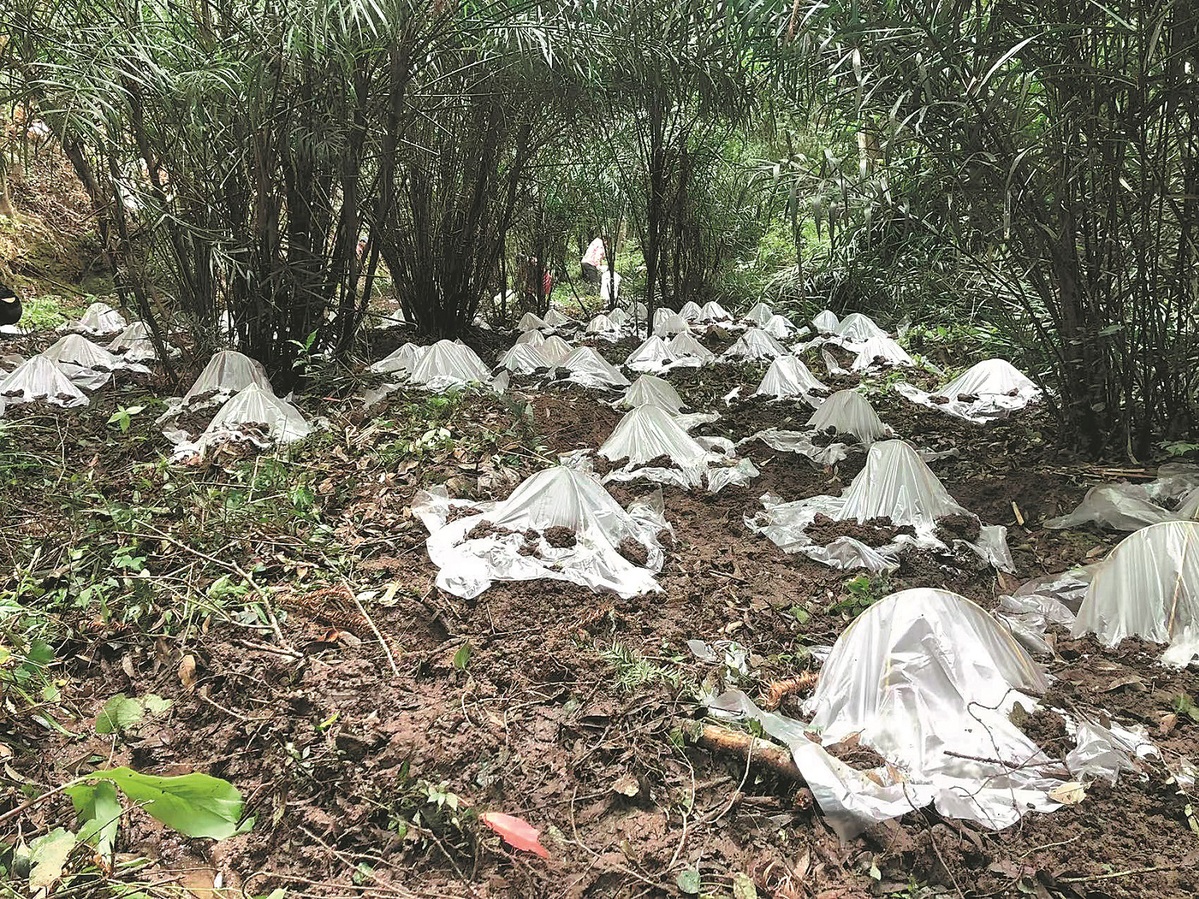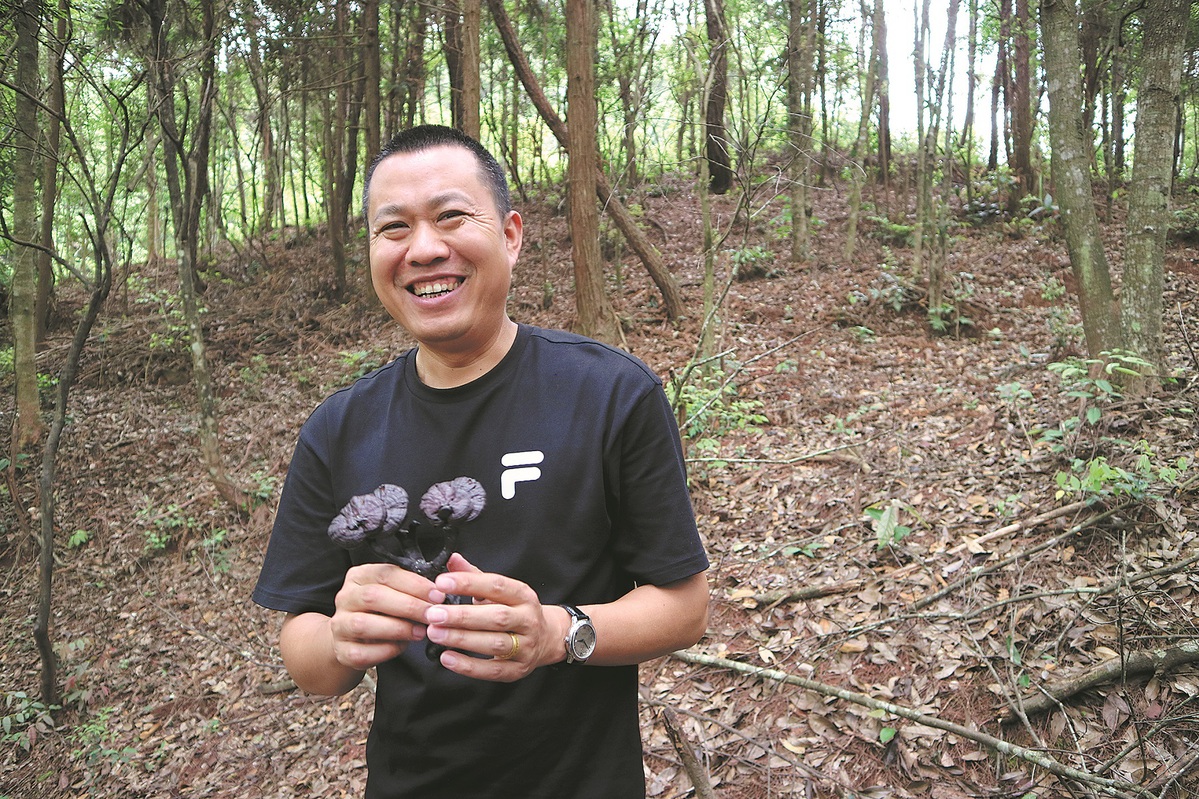(ANN/THE CHINA DAILY) – In mid-May, as you step into the serene, mountainous forestland of Jiewen village in Wuping county, Longyan, Fujian province, you’ll immediately feel a sudden drop in temperature.
This cooler environment is the perfect haven for a unique crop of fungi, nurtured under the protective shade of “white umbrellas.”
These ingenious devices are the brainchild of a dedicated local farmer, working hand-in-hand with agricultural authorities to foster a thriving ecosystem.
Scattered like gentle guardians across the forest floor, these umbrellas stand 40 centimetres (cm) tall and span 80 cm wide.
Beneath their protective canopy, vibrant purple Reishi mushrooms flourish, some already reaching an impressive 10 cm in height. These small umbrellas are more than just tools; they symbolize the innovative spirit and deep connection to nature held by the local growers.
The purple Reishi mushroom, known as ganoderma sinense, is a treasured gem in traditional Chinese medicine.

Revered for its remarkable ability to boost immune function, this valuable fungus is used to treat a myriad of health issues, from cancer and heart disease to diabetes and emotional disorders.
“Purple Reishi mushrooms demand precise environmental conditions for optimal growth. Thriving best in high temperatures and humidity, they prefer a temperature range of 22 to 28 C and humidity levels between 85 to 95 percent, and they should be shielded from direct sunlight,” said Luo Ronghui, a 42-year-old resident who is responsible for a roughly one square kilometre plantation of purple Reishi mushrooms in Jiewen.
Having spent a decade working in Fujian’s Xiamen, Luo decided to return to the village in 2012, drawn by the ideal natural conditions for fostering an under-forest economy and the prospect of selling the high-quality medical fungus and its byproducts, including tea.
The village, which led the nation in comprehensive forestry ownership reform in 2008 for ecological environment preservation, boasts abundant broad-leaved forest resources.
Its forests provide a warm, moist and well-ventilated environment for the growth of purple Reishi mushrooms that, according to Luo, guarantee their high quality and high yield.
However, he emphasised that the ample precipitation in Fujian presents a hurdle for the fungi’s cultivation.
“During the spring of 2022, we experienced two months of continuous rainfall here, leading to the loss of more than 2.66 hectares of purple Reishi mushrooms in the area with poor drainage like low-lying areas,” he added.
To resolve the problem, he has partnered with the local agricultural authorities in recent years, and their collaboration led to the development of the “white umbrella”, which aims to reduce the impact of short-term precipitation on the fungi.
“The umbrellas serve multiple purposes such as waterproofing, insect protection and providing shade from direct sunlight.
Moreover, the elevated carbon dioxide levels beneath the umbrellas can expedite the growth process,” he said, adding that they are still trying to explore diverse solutions to address various natural threats.
Luo also participates in a WeChat group established by the county-level meteorological department, dedicated to offering weather updates for the local cultivation of purple Reishi mushrooms.
Consisting of more than 150 farmers from the county, the group shares a three-day weather forecast daily during the planting and harvesting periods, along with expert evaluations on the suitability of farming activities.
Throughout the growth stage, the meteorological department ensures that prompt notifications are posted in the group in cases of heavy rainfall or pest infestation.

Furthermore, Luo has installed sensors in the forest to offer real-time data on factors such as temperature, moisture levels, oxygen content and the presence of pests in the vicinity, reducing labor costs while increasing the quantity and quality of purple Reishi mushrooms, he said.
“Some migrant workers have returned and have started farming after seeing the profitability of the under-forest economy led by purple Reishi mushroom cultivation,” Luo said.
He said that residents frequently turn to him for guidance on planting techniques, and he always tries his best to solve their problems.
“A single flower doesn’t herald spring. It is only through the collective success of the entire village in cultivating top-tier, high-yielding purple Reishi mushrooms that we can build a brand, elevate living standards and enhance the well-being of all villagers,” he said.



















































